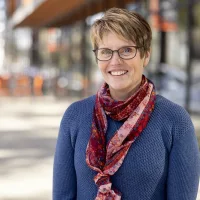
By Molly Rosbach, molly.rosbach@oregonstate.edu
Sources: Molly Kile, molly.kile@oregonstate.edu; Veronica Irvin, veronica.irvin@oregonstate.edu
This news release is available online: https://beav.es/oWj
CORVALLIS, Ore. — A team of Oregon State University public health researchers have received a $1.2 million grant from the National Institute of Environmental Health Sciences (NIEHS) to develop and test a well-water safety program for private well owners in Jackson County, Oregon.
Private wells are not regulated the way public water systems are, so owners are not required to conduct regular testing on their water. There also are not systems in place to tell owners what to do if their water tests positive for toxic chemicals like nitrates, arsenic or lead, which are known to be harmful to people’s health.
Jackson County was selected because arsenic, nitrate and lead have been detected in private well drinking water there and state data shows roughly 27,000 homes in the county have a domestic well, though that number does not include wells built before the state began collecting data. Ultimately, researchers hope to expand the program to other counties in Oregon and beyond.
Environmental epidemiologist Molly Kile at OSU has done significant research on reducing environmental hazards, which are associated with 25% of mortality and morbidity worldwide.
One of the challenges she sees in well testing is that many toxic chemicals are invisible, odorless and tasteless, so people don’t see them as a threat and tend to say, “I’ve been drinking this water forever and I’m fine.”
“Yet the health effects from drinking water that contains arsenic, nitrate and lead are real,” Kile said, adding that the threat is greatest for people who rely on well water for their drinking water. “Arsenic levels in this country have reduced for people who are on municipal water, but not domestic well water, so you have this disparity because of gaps in the Safe Drinking Water Act.”
During the first year of the four-year grant, the team will use focus groups to learn what barriers well owners perceive in getting their water tested and in taking further steps to fix their wells if toxic chemicals are detected. The researchers will work closely with well owners to develop materials to help guide them through the testing and mitigation process.
Researchers will spend the remaining three years conducting a randomized control trial, testing the wells of about 4,000 households in Jackson County.
Owners of all wells that are tested will receive their results, but only those whose water tests positive for toxic chemicals will be invited to participate in the next randomized control trial, where researchers will put their materials to the test and determine which pieces of the program are most helpful in getting well owners to fix the problem with their well. Researchers estimate about 215 well owners will be part of that second trial.
“I spend a lot of time helping people interpret those results,” said Chrissy Lucas-Woodruff, outreach program coordinator in OSU’s Benton County Extension Service. “Sometimes I’m the only person who’s telling them, ‘You shouldn’t be drinking this water; (the toxic chemical) is too high, and it can cause these health issues.’”
Lucas-Woodruff will work with Kile and behavioral epidemiologist Veronica Irvin, both in the College of Public Health and Human Sciences. The final study partner is the Oregon Health Authority’s Domestic Well Safety Program, which is providing statewide outreach materials along with expertise in local and state capacity to assess and manage risks.
Their idea is to teach well owners to think of testing the water like any other recommended test for their own health, such as cancer screenings or annual physicals. Extension agents, including Lucas-Woodruff, will help explain test results and walk people through treatment decisions and options.
Extension agents will be able to build on their existing relationships within rural communities to establish trust with well owners and talk about obstacles that may keep them from testing their water or following through to fix problems.
The grant will also test the scalability and reliability of the program they’re developing, Irvin said, to determine if they’ll be able to replicate it at other Extension sites throughout Oregon and the U.S., and with other state agencies like the Oregon Health Authority.
The Oregon Health Sciences University Knight Cancer Institute’s Community Partnership Program provided seed money for a pilot version of the program currently recruiting participants.
The researchers emphasized that the work can proceed remotely and safely, with or without COVID-19 restrictions in place.















